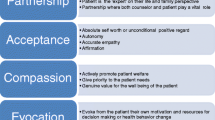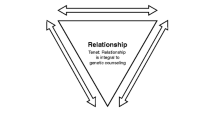Abstract
As the genetic counseling field evolves, a comprehensive model of practice is critical. The Reciprocal-Engagement Model (REM) consists of 5 tenets and 17 goals. Lacking in the REM, however, are well-articulated counselor strategies and behaviors. The purpose of the present study was to further elaborate and provide supporting evidence for the REM by identifying and mapping genetic counseling strategies to the REM goals. A secondary, qualitative analysis was conducted on data from two prior studies: 1) focus group results of genetic counseling outcomes (Redlinger-Grosse et al., Journal of Genetic Counseling, 2015); and 2) genetic counselors’ examples of successful and unsuccessful genetic counseling sessions (Geiser et al. 2009). Using directed content analysis, 337 unique strategies were extracted from focus group data. A Q-sort of the 337 strategies yielded 15 broader strategy domains that were then mapped to the successful and unsuccessful session examples. Differing prevalence of strategy domains identified in successful sessions versus the prevalence of domains identified as lacking in unsuccessful sessions provide further support for the REM goals. The most prevalent domains for successful sessions were Information Giving and Use Psychosocial Skills and Strategies; and for unsuccessful sessions, Information Giving and Establish Working Alliance. Identified strategies support the REM’s reciprocal nature, especially with regard to addressing patients’ informational and psychosocial needs. Patients’ contributions to success (or lack thereof) of sessions was also noted, supporting a REM tenet that individual characteristics and the counselor-patient relationship are central to processes and outcomes. The elaborated REM could be used as a framework for certain graduate curricular objectives, and REM components could also inform process and outcomes research studies to document and further characterize genetic counselor strategies.


Similar content being viewed by others
References
ACGC (2015). ACGC Core Competencies. Retrieved from http://www.gceducation.org/Documents/ACGC%20Core%20Competencies%20Brochure_15_Web.pdf.
Akhtar-Danesh, N., Baumann, A., & Cordingley, L. (2008). Q-methodology in nursing research: a promising method for the study of subjectivity. Western Journal of Nursing Research, 30(6), 759–773. doi:10.1177/0193945907312979.
Anderson, S. R., Berrier, K. L., Redlinger-Grosse, K., & Edwards, J.G. (2015). The genetic counselor-patient relationship following a life-limiting prenatal diagnosis: an exploration of the Reciprocal-Engagement Model. Manuscript submitted for publication.
Austin, J., Semaka, A., & Hadjipavlou, G. (2014). Conceptualizing genetic counseling as psychotherapy in the era of genomic medicine. Journal of Genetic Counseling, 23, 903–909 http://doi.org/10.1007/s10897-014-9728-1.
Benkendorf, J. L., Prince, M. B., Rose, M. A., De Fina, A., & Hamilton, H. E. (2001). Does indirect speech promote nondirective genetic counseling? Results of a sociolinguistic investigation. American Journal of Medical Genetics, 106, 199–207. doi:10.1002/ajmg.10012.
Berkenstadt, M., Shiloh, S., Barkai, G., Katznelson, M., & Goldman, B. (1999). Perceived personal control: a new concept in measuring outcome of genetic counseling. American Journal of Medical Genetics, 82, 53–59.
Bernhardt, B. A., Biesecker, B. B., & Mastromarino, C. L. (2000). Goals, benefits, and outcomes of genetic counseling: client and genetic counselor assessment. American Journal of Medical Genetics, 94, 189–197.
Biesecker, B. B. (2003). Back to the future of genetic counseling: commentary on “Psychosocial genetic counseling in the post-nondirective era”. Journal of Genetic Counseling, 12, 213–217.
Curtis, J. R., Wenrich, M. D., Carline, J. D., Shannon, S. E., Ambrozy, D. M., & Ramsey, P. G. (2001). Understanding physicians’ skills at providing end-of-life care. Journal of General Internal Medicine, 16, 41–49.
Dziopa, F., & Ahern, K. (2011). A systematic literature review of the applications of Q-technique and its methodology. Methodology, 7, 39–55. doi:10.1027/1614-2241/a000021.
Ellington, L., Baty, B. J., McDonald, J., Venne, V., Musters, A., Roter, D., et al. (2006). Exploring genetic counseling communication patterns: the role of teaching and counseling approaches. Journal of Genetic Counseling, 15, 179–189.
Elo, S., & Kyngäs, H. (2008). The qualitative content analysis process. Journal of Advanced Nursing, 62, 107–115. doi:10.1111/j.1365-2648.2007.04569.x.
Fox, M., Weil, J., & Resta, R. (2007). Why we do what we do: commentary on a reciprocal-engagement model of genetic counseling practice. Journal of Genetic Counseling, 16, 729–730. doi:10.1007/s10897-007-9118-z.
Geiser, J., LeRoy, B., McCarthy Veach, P., Bartels, D., & Berry, S. (2009). Identifying success in genetic counseling sessions: counselor perceptions of the goals of the reciprocal engagement model. University of Minnesota.
Hallowell, N., Statham, H., Murton, F., Green, J., & Richards, M. (1997). “Talking about chance”: the presentation of risk information during genetic counseling for breast and ovarian cancer. Journal of Genetic Counseling, 6, 269–286.
Hartmann, J. E., Veach, P. M., MacFarlane, I. M., & LeRoy, B. S. (2015). Genetic counselor perceptions of genetic counseling session goals: a validation study of the reciprocal-engagement model. Journal of Genetic Counseling, 24, 225–237. doi:10.1007/s10897-013-9647-6.
Hsieh, H.-F., & Shannon, S. E. (2005). Three approaches to qualitative content analysis. Qualitative Health Research, 15, 1277–1288.
Kessler, S. (1997). Psychological aspects of genetic counseling. IX. Teaching and counseling. Journal of Genetic Counseling, 6, 287–295.
Kessler, S. (2000). Closing thoughts on supervision. Journal of Genetic Counseling, 9, 431–434.
Lerner, B., Roberts, J. S., Shwartz, M., Roter, D. L., Green, R. C., & Clark, J. A. (2014). Distinct communication patterns during genetic counseling for late-onset Alzheimer’s risk assessment. Patient Education and Counseling, 94, 170–179. doi:10.1016/j.pec.2013.10.019.
Lewis, L. J. (2002). Models of genetic counseling and their effects on multicultural genetic counseling. Journal of Genetic Counseling, 11, 193–212.
Lobb, E., Butow, P., Meiser, B., Tucker, K., & Barratt, A. (2001). How do geneticists and genetic counselors counsel women from high-risk breast cancer families? Journal of Genetic Counseling, 10, 185–199.
MacFarlane, A., & O’Reilly-de Brun, M. (2012). Using a theory-driven conceptual framework in qualitative health research. Qualitative Health Research, 22, 607–618. doi:10.1177/1049732311431898.
Macleod, R., Craufurd, D., & Booth, K. (2002). Patients’ perceptions of what makes genetic counselling effective: An interpretative phenomenological analysis. Journal of Health Psychology, 7, 145–156. doi:10.1177/1359105302007002454
McCarthy Veach, P., Truesdell, S. E., LeRoy, B. S., & Bartels, D. M. (1999). Client perceptions of the impact of genetic counseling: an exploratory study. Journal of Genetic Counseling, 8, 191–216.
McCarthy Veach, P., Bartels, D. M., & LeRoy, B. S. (2002). Commentary on genetic counseling—a profession in search of itself. Journal of Genetic Counseling, 11, 187–191.
McCarthy Veach, P., LeRoy, B., & Bartels, D. M. (2003). Facilitating the genetic counseling process a practice manual. New York: Springer.
McCarthy Veach, P., Bartels, D. M., & LeRoy, B. S. (2007). Coming full circle: a reciprocal-engagement model of genetic counseling practice. Journal of Genetic Counseling, 16, 713–728. doi:10.1007/s10897-007-9113-4.
McCarthy Veach, P., LeRoy, B., & Bartels, D. M. (2010). Genetic counseling practice: advanced concepts and skills. Hoboken: Wiley-Blackwell.
Meiser, B., Irle, J., Lobb, E., & Barlow-Stewart, K. (2008). Assessment of the content and process of genetic counseling: a critical review of empirical studies. Journal of Genetic Counseling, 17, 434–451. doi:10.1007/s10897-008-9173-0.
Redlinger-Grosse, K. (2016). A different vantage point: commentary on 'Theories for Psychotherapeutic genetic counseling: fuzzy trace theory and cognitive behavior theory’. Journal of Genetic Counseling. Advance Online Publication: doi:10.1007/s10897-016-0024-0.
Redlinger-Grosse, K., Veach, P. M., Cohen, S., LeRoy, B. S., MacFarlane, I. M., & Zierhut, H. (2015). Defining our clinical practice: the identification of genetic counseling outcomes utilizing the reciprocal engagement model. Journal of Genetic Counseling. Advance Online Publication. doi:10.1007/s10897-015-9864-2.
Resta, R., Biesecker, B. B., Bennett, R. L., Blum, S., Estabrooks Hahn, S., Strecker, M. N., & Williams, J. L. (2006). A new definition of genetic counseling: national society of genetic counselors’ task force report. Journal of Genetic Counseling, 15, 77–83.
Rieh, J. P., & Ray, C. (1974). Conceptual models for nursing practice. New York: Appleton-Century-Crofts.
Roter, D., Ellington, L., Erby, L. H., Larson, S., & Dudley, W. (2006). The genetic counseling video project (GCVP): models of practice. American Journal of Medical Genetics Part C: Seminars in Medical Genetics, 142C, 209–220. doi:10.1002/ajmg.c.30094.
Weil, J. (2003). Psychosocial genetic counseling in the post-nondirective era: a point of view. Journal of Genetic Counseling, 12, 199–211.
Yager, G. G. (2014). Commentary on “Conceptualizing genetic counseling as psychotherapy in the era of genomic medicine”. Journal of Genetic Counseling, 23, 935–937. doi:10.1007/s10897-014-9734-3.
Acknowledgements
This study was completed in partial fulfillment of the requirements for the first author’s Doctor of Philosophy degree from the University of Minnesota. The authors would like to thank Yu Huang, MA for her time and dedication in the qualitative coding process.
Dr. Christina Palmer served as Action Editor on the manuscript review process and publication decision.
Author information
Authors and Affiliations
Corresponding author
Ethics declarations
Conflict of Interest
Krista Redlinger-Grosse, Patricia McCarthy Veach, Bonnie S. LeRoy, and Heather Zierhut declare they have no conflict of interest.
Human Studies and Informed Consent
All procedures followed were in accordance with the ethical standards of the responsible committee on human experimentation (institutional and national) and with the Helsinki Declaration of 1975, as revised in 2000. This study was approved by the University of Minnesota IRB. Informed consent was obtained from all individual participants included in the study.
Animal Studies
This article does not contain any studies with animals performed by any of the authors.
Electronic Supplementary Material
Supplementary Table 1
(DOCX 32.6 kb)
Rights and permissions
About this article
Cite this article
Redlinger-Grosse, K., Veach, P.M., LeRoy, B.S. et al. Elaboration of the Reciprocal-Engagement Model of Genetic Counseling Practice: a Qualitative Investigation of Goals and Strategies. J Genet Counsel 26, 1372–1387 (2017). https://doi.org/10.1007/s10897-017-0114-7
Received:
Accepted:
Published:
Issue Date:
DOI: https://doi.org/10.1007/s10897-017-0114-7




